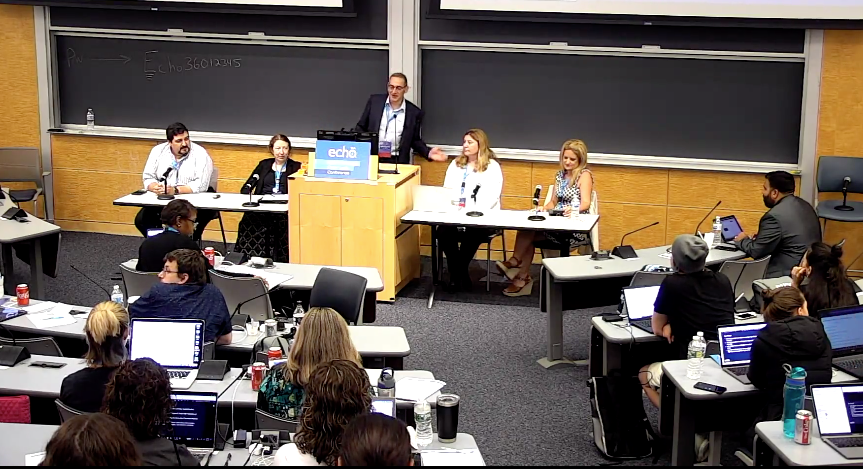Making Video Inclusive and Accessible for All Learners

“I (or my institution) have everything I need to make video inclusive and accessible to all learners.”
Participants attending a session titled, “Making Video Inclusive and Accessible: A Panel Discussion,” at our recent North American User Community Conference were asked to respond to the statement above. It became the focus of the ensuing panel discussion, during which experts from four universities shared how their institutions are using Echo360’s automatic speech recognition (ASR) to make video more accessible and learning more inclusive:
The panel members were:
- Sheri Restauri, Director of Online Learning, Coastal Carolina University
- Tony Ramirez, Instructional Designer III, Texas A&M International University
- Julie Gregg, Instructional Designer, University of Nebraska Medical Center
- Genevieve Mathieson Kilmer, Senior Instructional Technologist, Teaching and Learning Technologies, Case Western Reserve University
Each panelist’s university has taken a different approach toward adopting ASR on campus based on their unique needs and challenges.
At Coastal Carolina University, the institution has allocated faculty grants to encourage adoption. These grants require that instructors be trained in universal design and commit to enabling captions and transcripts for every classroom video recorded using Echo360. The ultimate goal at Coastal Carolina University is to caption every class using the Echo360 ASR solution.
Texas A&M International University (TAMIU) has two (2) goals for implementing Echo360: meeting the needs of students requiring special accommodation and improving access to learning for students for whom English is not their native language. TAMIU expect both student groups to benefit from the availability of transcripts and captions automatically synchronized with the Echo360 video playback experience.
Five (5) colleges at the University of Nebraska are using the Echo360 ASR capability for the benefits it provides as a study aid for all students. The ability to listen to recorded videos and simultaneously read the associated transcript helps to create a multi-modal learning environment. Searchable transcripts also help students during review and prepare for assessments and testing.
At Case Western Reserve University, about 9 percent of the student population has requested accommodation through the university’s disability resources office. Special accommodations include closed captioning of recorded lectures. In the Spring 2019, Case Western began using Echo360 ASR to help satisfy those requirements. In addition to meeting the needs of students with accommodations, faculty members there also see ASR as a means to reach all learners, regardless of their background and ability.
No matter how an institution chooses to implement Echo360 ASR, the panel members agreed on the following observations:
- The benefits of ASR-generated transcripts are not limited to students who require special accommodation; accessibility and inclusivity helps meet the needs of all students.
- Student learning outcomes are improved when access to learning content is easier.
- Searchable, ASR-generated transcripts can help improve student retention, reduce DFW rates, and ultimately improve GPA and student success.
- ASR supports an immersive, multi-modal learning experience. All students can benefit from the ability to watch, listen, read, and ultimately search transcripts.
Watch the video, “Making Video Inclusive and Accessible: A Panel Discussion” from the recent Echo360 Community Conference and assess your institution’s response to the inclusivity and accessibility question.
If you have more questions and would like to learn more about Echo360’s ASR solution, contact us.

